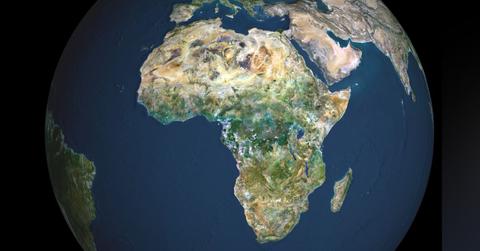Evolving Earth: Scientists Predict African Continent to Split, Possibly Forming New Ocean

Scientists say Africa, the world's second-largest continent, is slowly splitting up in a process that will unfold over millions of years.
Jan. 3 2024, Published 1:04 p.m. ET
Africa, the world's second-largest continent, is currently undergoing a profound geological transformation.
Scientists reveal that the continent is gradually splitting apart, a process expected to unfold over millions of years, IFLScience reported.
The new report from IFLScience states experts predict that a section of East Africa will detach from the rest of the continent, potentially giving rise to a new ocean between the separated land masses.
This monumental event is attributed to the East African Rift System, or EARS, an extensive land fracture spanning thousands of miles from the Middle East in the north to Mozambique in the south. This geologically active region is filled with volcanoes, hot springs, geysers and experiences frequent earthquakes.
A study published in the journal Earth and Planetary Science Letters in 2004 found that the EARS is gradually dividing Africa into two distinct entities: the smaller Somalian plate and the larger Nubian plate. These plates are slowly moving away from each other at an exceptionally sluggish pace of millimeters per year.
According to National Geographic, the Nubian plate will bear the majority of the continent, while the smaller Somali plate, encompassing the Horn of Africa, will evolve into a "continental island" similar to Madagascar or New Zealand.
- What Lies Beneath: NASA Scientist Believes Aliens May Have Found 'Perfect' Hiding Spot in Earth's Oceans
- Global Threat: Russia Insider Warns West of 'World War Using Nuclear Weapons' Amid Escalating Support for Ukraine
- Countdown to Disaster? Ex-NATO Official Warns Russia, Iran and China Could Wage WWIII in Just Years
The ongoing process of seafloor spreading, where new oceanic crust is formed in underwater mountain ranges, continues to widen the gap between these regions, sources said.
IFLScience reported that changes within the EARS may lead to the separation of East Africa from the main continent, forming a vast sea between them in the next 5 to 10 million years.
Never miss a story — sign up for the Front Page Detectives newsletter. Be on the scene the moment news breaks.
This dynamic transformation of the Earth's surface is a consequence of the constant movement of interlocking tectonic plates.
Approximately 138 million years ago, a landmass separated to give rise to the present continents of South America and Africa, whose coasts resemble interconnected puzzle pieces. Experts anticipate that the future separation of Africa will follow a similar pattern.
Become a Front Page Detective
Sign up to receive breaking
Front Page Detectives
news and exclusive investigations.
